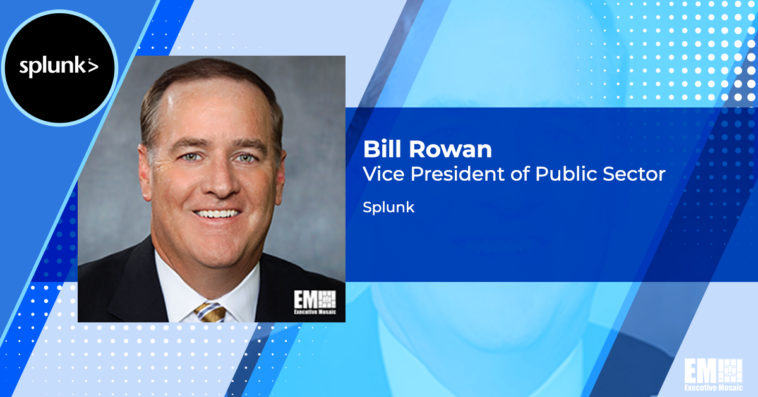New challenges and opportunities are emerging as government and industry organizations migrate to the cloud and step into the next era of digital transformation. From the onset of the COVID-19 pandemic, much of this migration and modernization has been accelerated, and now, GovCon leaders are taking a closer look at how to better protect their data and assets against the growing threat of attacks.
ExecutiveBiz spoke with Bill Rowan, vice president of public sector at Splunk and three-time Wash100 Award winner, to discuss the cybersecurity and data-related issues organizations are facing, as well as what they can do to solve them. Rowan joined Splunk in July 2022 and has since focused on working closely with government customers to mature their cyber hygiene practices as the landscape evolves.
Read below for the full interview with Splunk’s Bill Rowan.
ExecutiveBiz: Bill, you joined Splunk as vice president of public sector in July. Congratulations on your new position! Can you talk about why you wanted to join Splunk and what were the attributes of its mission that attracted you to the role? What do you hope to accomplish with the company?
Bill Rowan: “Why I wanted to join and what Splunk does are interconnected. Since the beginning of the pandemic, every single digital transformation customer out there today is now a multi-cloud customer, to include some aspect of private cloud on-prem. This is true not only on the federal level, but on the state and local levels as well. Almost all customers now have some sort of SaaS implementation. In addition to that, the workforce is a lot more disparate than it ever was before.
In terms of cybersecurity, the attack vector has gotten much bigger and more complicated. Splunk sets themselves apart as one of the few companies that can holistically help with that problem. Cybersecurity is not about just one platform — that’s what gets us into problems. We need to have a much more holistic view. When I was making the decision to join the company, I could see that Splunk was very well positioned to help attack that specific problem. It’s not a problem that’s going to go away. In fact, in my view, it’s going to get bigger and bigger.
In this role, my focus is to ensure that Splunk continues to be a trusted advisor to our government customers and that we are creating solutions that evolve with their needs. I’m also really passionate about our partner relationships and will be working to maximize our efforts with them in the market. We have become much more active listeners and much better at sharing where we’re taking our technology, but we can’t take our technology in the right direction unless we understand some of the challenges that our customers are laying out for us.
Like any other tech company, we’ve seen turnover in the last 18-24 months in the marketplace. As we bring in new talent, we’re strategically aligning that talent properly to ensure we’re meeting the customer’s needs. I’m very excited about where we are now, and I’m even more excited about what the future holds for us down the road.”
ExecutiveBiz: What do you see as the most critical challenges facing those in the federal sector as cybersecurity continues to rise in importance and cyber hygiene becomes a necessity for all companies and even more critical at the national security level?
Rowan: “As I mentioned earlier, the attack vector has gotten much larger, especially in SaaS and multi-cloud environments. We’re not going to go backwards. The attack vector is going to continue to expand as more and more customers start to put multiple applications in different clouds or move workloads from one cloud solution provider to another. That’s going to present another set of issues.
The secondary part of that is this is not just a technology issue. This is about constantly modifying and looking at our practices and examining how we manage this environment. It’s about continuing to evolve as that space continues to change.
Looking back at the pandemic, the government — federal, state and local — did a spectacular job in pivoting to be able to provide constituent services. It was an unbelievable amount of transformation in a short period of time. But with all that transformation, we have to also ensure that we’ve put together a good hygiene plan to manage that environment over a period of time.
We also have to understand that doing tasks manually is just not something we can continue to do. We’ve got to be able to add automation, and we’ve got to be able to add observability to be able to visually depict what’s going on in the environment at any given time. I think those things are going to go hand in glove with the security industry.
Some of our biggest customers realize that resilience is not something we do just today, but it’s an ongoing process. Again, we have to partner not just with the end users, but also with the value added resellers and integrators we work with as they define solutions to ensure we’re continuing to shift to give the customers the best impact we possibly can for their dollar.”
ExecutiveBiz: We’ve seen Splunk making strides within the public sector, such as your recent IL5 provisional authorization and government logging modernization program launch. What were the key factors that led to that company-wide performance and how will you continue to work to capitalize on that success moving forward?
Rowan: “Our IL5 accreditation is yet one step in what is going to be a much longer, broader action by Splunk. The government has clearly laid out that they want to see a framework within FedRAMP that allows customers to migrate their data to the cloud. We are very excited that we’ve been able to partner with not just civilian agencies, but with Department of Defense agencies to help make that a reality by both the accreditations we have today and the accreditations that are on our roadmap.
It is our intent to take all of our products into that type of framework over a period of time, and we do that in many ways. Like I mentioned earlier, we’re partnering with customers. In addition to that, we’re in the StateRAMP process. 27 of the 50 states have announced that they’re going to use StateRAMP as a compliance framework to ensure their data is protected. It’s an exciting time for us.
Lastly, the municipal level is one of the fastest adopters of our FedRAMP cloud environment. I think the government will continue to consider logging mandates because they understand it gives them a lot more richness around the data. We’ll continue to evolve our solutions to meet those ongoing mandates.”
ExecutiveBiz: What are your strategic goals for the coming year? What do you hope to accomplish and are there any new markets that you’re keeping an eye on?
Rowan: “I really want to focus on three things. First is taking our strategic relationships to the next level with our customers. It’s important that we continue to serve as trusted advisors to our client base as the landscape changes.
Secondly, I think we need to expand our use cases for customers. One thing that sets us apart from our competitors is our app store with over 3,000 apps that we or our customers have developed and that are available for our customers to use. We recently released an app that does showback, chargeback and predictive analytics on how much additional capacity you’ll need to continue to support your environment as it grows. Many of those apps are free to customers.
We’ve got to be able to educate our customers on the power they can get out of technology to make their lives simpler. Not all customers are at the same level technically. We have to do a better job of helping them to see what is going on, what challenges they’re facing and how they’re addressing those challenges.
The third component is constantly evolving our message and our communication to make customer issues easier to manage. How do we help customers automate the tasks they go through on a day-to-day basis? Automation will help solve a lot of the mundane tasks that are taking up people’s time. With observability, how do we give customers a better operational picture of what’s happening in their environment?
That said, I’m really excited about where the business is going, not just because of how broad our platform is but because all of our accounts are doing a multitude of things and customers are looking for ways to simplify that operational profile. I think we’re one of those companies that can help them do that and do it in such a way that we’re leveraging the investments our customers have already made, but also growing with them on their journey to the cloud.”





